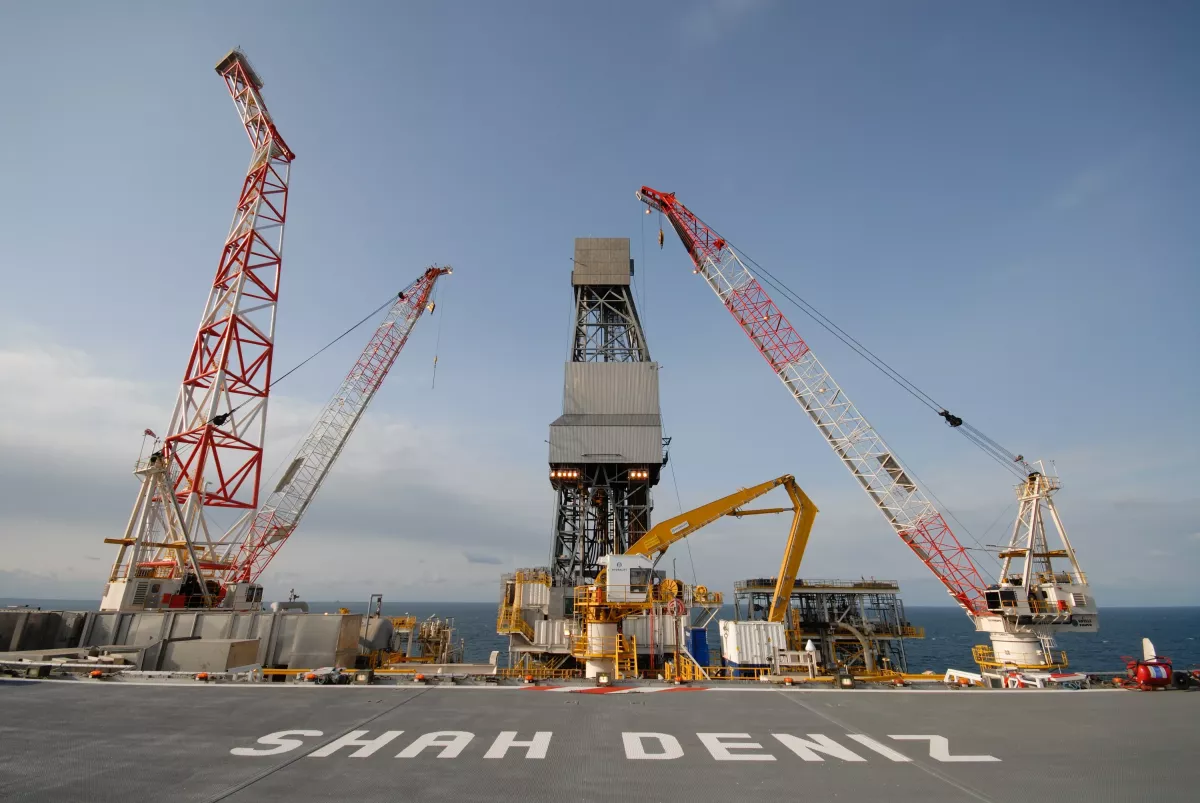Azerbaijan and bp: A strategic partnership driving energy transition Three decades of cooperation
The signing of the “Contract of the Century” and the commencement of development on the Azeri-Chirag-Gunashli (ACG) oil field block, along with subsequent agreements for offshore fields, laid the foundation for Azerbaijan’s long-term economic growth strategy. For over three decades, bp has been a key partner in this sector, investing tens of billions of dollars into the country’s oil and gas infrastructure.
Today, alongside ongoing projects in resource extraction, bp is increasingly focused on green energy development and digital transformation. Promising initiatives in exploration, production, and decarbonisation were recently discussed during a meeting between Azerbaijani President Ilham Aliyev and bp’s Chief Executive Officer, Murray Auchincloss.
The significance of British Petroleum (bp), the largest multinational oil and gas company with British capital, in Azerbaijan’s energy sector cannot be overstated. For over thirty years, bp has spearheaded the development of major energy projects in Azerbaijan’s Caspian Sea sector. The company operates the offshore Azeri-Chirag-Gunashli (ACG) oil fields and the Shah Deniz gas-condensate field. Additionally, bp holds equity stakes in key infrastructure projects such as the Baku-Tbilisi-Ceyhan (BTC) oil export pipeline and the South Caucasus Pipeline, and it owns a 20% share in the Southern Gas Corridor (SGC) consortium. To date, investments from bp and its international partners in these ventures have exceeded $85 billion.
In recent years, this successful partnership has gained fresh momentum through bp’s involvement in promising initiatives to expand oil, condensate, and gas production at both existing and new fields, alongside its active participation in Azerbaijan’s decarbonisation efforts. These collaborative projects continue to receive high-level governmental support and attention, underscoring their strategic importance to the country’s energy future.

During the negotiations on June 19 between Azerbaijani President Ilham Aliyev and bp’s Chief Executive Officer Murray Auchincloss, the longstanding and successful partnership between Azerbaijan and bp was strongly reaffirmed. The discussion highlighted the effective utilisation of energy revenues in driving the country’s socio-economic development.
The leaders exchanged views on future cooperation prospects between SOCAR (State Oil Company of the Azerbaijan Republic) and bp, and discussed Azerbaijan’s critical role in enhancing energy security for several European nations.
The conversation also underscored Azerbaijan’s substantial potential in renewable energy sources (RES), alongside its hydrocarbon resources. Particular emphasis was placed on bp’s involvement in renewable energy projects within territories recently liberated from occupation, highlighting a forward-looking approach to sustainable development.
On the same day, a meeting was held between Azerbaijan’s Minister of Economy, Mikail Jabbarov, and bp’s CEO, Murray Auchincloss.
“During the meeting, we emphasised that the new agreements signed within the framework of Baku Energy Week will further strengthen the longstanding strategic partnership in the energy sector.
We highly appreciated bp’s active engagement in Azerbaijan’s renewable energy initiatives and exchanged views on the company’s operations in the country, including decarbonization efforts, as well as ongoing exploration and production projects,” Jabbarov wrote on X.

A delegation led by Auchincloss also held productive talks with Azerbaijan’s Minister of Energy, Parviz Shahbazov. During the meeting, both sides expressed satisfaction with their ongoing cooperation in the oil and gas sector as well as in renewable energy development. They highlighted the crucial role of alternative energy sources in addressing energy security, environmental protection, and sustainable development challenges.
The discussion further covered the advancement of existing energy projects, along with plans for implementing the “green energy corridor” and its interconnectors, aiming to enhance regional energy integration and sustainability.
Support was also voiced for the newly appointed regional president of bp for Azerbaijan, Georgia, and Türkiye, Giovanni Cristofoli, who accompanied the delegation. Christofoli is set to assume his role on October 1, 2025, operating from bp’s Baku office.
Notably, despite a recent decline in oil production at the Azeri-Chirag-Gunashli (ACG) block, Azerbaijan and its key consortium partner, bp, continue to pursue efforts to unlock the full resource potential of the Caspian Sea. Following the signing of the second “Contract of the Century” in Baku on September 14, 2017—which extends development of the ACG block until 2050—the investment commitment increased by an additional $43 billion.
bp’s role remains critically important in these projects, which aim to produce over 500 million tonnes of oil and condensate. The company holds a 30.37% operating stake in the ACG block, maintaining its position as a major driver of Azerbaijan’s offshore oil production.
The operator company, bp Azerbaijan, is undertaking extensive efforts to increase production at the country’s principal offshore gas field, Shah Deniz. A key milestone is the expected final investment decision (FID) for the construction of the autonomous Shah Deniz Compression (SDC) platform, anticipated by late 2025.
This compression project, which will integrate with the existing infrastructure of the Shah Deniz Alpha and Bravo platforms as well as the Sangachal terminal, is set to significantly enhance the field’s overall productivity. Work on the Shah Deniz Alpha platform is scheduled for completion by mid-2029, while upgrades on the Shah Deniz Bravo platform are projected to conclude in the second half of 2030.
In September 2024, bp signed a memorandum of understanding with SOCAR regarding the Karabakh field, followed by an agreement on the development project for the Ashrafi-Dan Ulduzu-Aypara block in the Azerbaijani sector of the Caspian Sea. Currently, bp has acquired a 35% stake in both projects and, according to the agreements, will serve as the operator for both.
First and foremost, bp plans to prepare and coordinate with SOCAR a development concept for the Karabakh field, located 20–25 km from ACG. If this project proves successful, the oil and gas extracted there could subsequently be transported to the Sangachal terminal via existing underwater export pipelines, eliminating the need to build new subsea infrastructure.

Azerbaijan’s cooperation with bp in the field of green energy and energy efficiency initiatives appears highly productive. “We are increasing our investments in upstream projects to $10 billion by 2027, while ensuring that we reduce environmental emissions,” said Gary Jones, bp’s regional president for Azerbaijan, Georgia, and Turkey, speaking at the Baku Energy Forum in early June. “The company actively combines the development of traditional oil and gas projects with substantial investments in decarbonisation and renewable energy.”
Notably, during the Caspian Oil & Gas exhibition, bp and Azerenergy JSC signed a document confirming the final investment decision for the construction of the 240 MW Shafag solar power plant in the Jabrayil district, which contributes to the decarbonisation of the Sangachal terminal. The electricity generated by this solar power plant will be sold to Azerenergy, which will, in turn, transfer an equivalent volume of electricity to Sangachal through a “virtual power purchase” mechanism. This scheme will reduce natural gas consumption at the terminal and significantly lower environmental impact.
bp experts have contributed to developing a comprehensive master plan for the decarbonisation of Azerbaijan’s energy sector. This plan aims to establish integrated green energy and transport systems, construct energy-efficient buildings, improve waste management, promote zero-waste industries, and more. Leading British firms, including bp and KBR, are actively engaged in research on offshore wind energy as well as the potential production and export of hydrogen fuel from Azerbaijan.
Additionally, bp-Azerbaijan, together with several international high-tech companies, supports the growth of the country’s startup ecosystem. They are exploring opportunities to participate in IT initiatives and to implement Industry 4.0 technologies, further advancing Azerbaijan’s technological and industrial modernisation.








